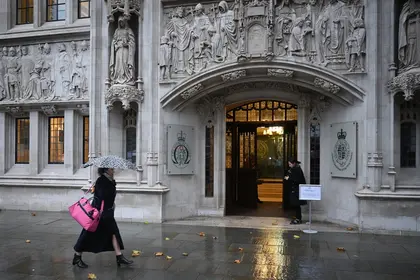Ukraine has managed to secure several victories on the economic front - one of the most crucial was the landmark ruling of London's High Court on the so-called “Yanukovych Debt” case in Ukraine’s favor. The case will now go to a full trial in a British court.
The case involves the so-called Eurobonds issued by the Yanukovych regime at the end of 2013 when the Revolution of Dignity was already in full swing. The bonds were then purchased by Russia as a result of preliminary agreements related to Putin’s “customs union.”
JOIN US ON TELEGRAM
Follow our coverage of the war on the @Kyivpost_official.
It was a matter of utmost importance for the former, pro-Russian president Yanukovych, as his ‘brilliant’ approach to economic policy made it so that the government didn't have any money to pay for its own social obligations.
His plan was to issue Eurobonds for a total amount of $15 billion, which would have been expected to be paid back in one day, which, in turn, would have led to an incredibly strong Ukrainian dependence on Russia.
Most likely, this is exactly how Putin planned to drag Ukraine into its “customs union,” leaving Yanukovych and (former Prime Minister) Azarov no choice in the matter.
Fortunately, Yanukovych escaped, Maidan won, and this debt reached only $3 billion.
Then Russia's aggression against Ukraine began, leading to significant economic problems - one of which was restructuring of the external debt, in particular Eurobonds and the “Yanukovych Debt.”

Britain to Provide $3 Billion Loan to Ukraine from Profits of $280 Billion Frozen Russian Assets
Ukraine offered Russia the opportunity to participate in restructuring on general terms, but Russia refused. Sure enough, no one paid the money back, so the Russians went to London's High Court, hoping to get the entire sum.
Now the Court has issued a ruling. So far it is only a procedural decision, not a final one.
The Court simply decided that the case should be considered in a standard procedure in an open session trial, not in the “fast” one, which already is a great victory for Ukraine.
Thus, if the “fast” procedure has been going on for 7 years, it is hard to imagine how much time the “long” procedure could take. And during all this time, nobody has been expected to pay Russia.
Even if Ukraine had lost in the Court and judges from London had decided that we indeed should pay Russia these $3 billion (maybe even more with interest) then no one would have paid.
But it certainly would have created problems and inconveniences in the future when Ukraine returns to the debt market after the war.
Also, the court basically recognized the Ukrainian claim that these loans were made under pressure from Russia - a deal at gunpoint, as you know, is not really considered a valid one.
Hence, in the next public hearing, Russia will have to prove it did not plan aggression against Ukraine and that it did not pressure Yanukovych.
Among other things, it will require publication of all the information regarding the negotiations at that time, including those that took place in the bunker in Sochi.
Moreover, they will have to prove to the judges in London that they did not threaten aggression. These judges see the consequences of this aggression in the British press every day.
One way or another, before this ruling, Ukraine most likely would have been expected to pay at one or another point and just hoped to postpone the payment as long as possible.
Now, however, there might be a chance Ukraine won't be expected to pay back anything at all. This would be nice from a humanitarian point of view because it would reduce Ukraine’s overall debt by 3 billion USD.
And what about Russia? They keep silent, as they probably haven't decided what to call this gesture of goodwill.
However, they continue to count these $3 billion as an asset in their National Welfare Fund, which they use to finance their budget.
Perhaps, when Russia runs out of other assets in the fund, the task of financing Russian teachers and doctors will be transferred to Yanukovych himself. At least for as long as he has enough money in Kamaz (truck manufacturer) stock he bought with dollars he took from Ukraine.
You can also highlight the text and press Ctrl + Enter






